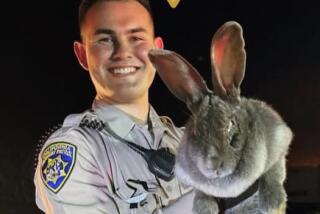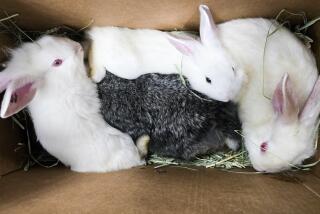Unless They’re Chocolate, Skip Easter Bunnies
- Share via
THE REGION — For a bunny, Easter can be a dangerous time.
Linked to that Christian holiday by ancient spring fertility rites, rabbits face mortal peril in their enduring role as the Easter Bunny, which appeared in American in the 1890s when confectioners first used Easter eggs to make cakes in the shape of rabbits.
Live Easter bunnies have been purchased by the score in the past few days, mostly as children’s gifts.
Once the novelty wears off, some of the rabbits will be turned in to animal shelters, and others neglected or abandoned by people who think they can survive in the wild. They can’t, and are easy prey for dogs, hawks and coyotes.
It’s a spring ritual that disheartens a growing number of enthusiasts who find rabbits as good as dogs and cats for household companionship.
“Bunnies make really nice pets for the right people who understand their special requirements,” said Joan Coleman, executive director of the San Gabriel Valley Humane Society. “But, unfortunately, our shelter receives hundreds of rabbits each year as a result of Easter impulse purchases.”
Homes are found for some, but most are euthanized.
This year, the humane society is conducting a campaign, “Better Than a Bunny” to encourage parents to adopt a puppy or kitten from the shelter instead of buying a rabbit for their child’s Easter gift.
“If someone wants to buy a bunny for Easter, they should buy a stuffed one,” said Liz Baronowski, educational director for the Pasadena Humane Society.
On the other hand, contrary to the widely held notion that rabbits belong outdoors in a cage, more and more people are taking them in as house pets.
Those who have discovered the joys and pitfalls of sharing their lives with bunnies know them as playful, curious, lively animal companions.
“My bunny, Willie Wabbit, has been a real joy in my life,” said Cindy Sakaki, who shares her Glendale apartment with the personable lop-eared dwarf rabbit. A nurse practitioner whose job includes working with AIDS patients, Sakaki loves to come home to her playful and affectionate pet.
“She sits on my lap and licks my hands and face, which is a bunny’s way of showing she cares about me,” Sakaki said. “Frequently, when I’m taking a bath, I’ll see this cute little bunny face peering at me over the edge of the tub. Sometimes, when I’m sitting at the kitchen table, she hops on a chair and sits at the table too.”
Sakaki has trained Willie Wabbit to a harness and leash, and the two are a crowd-pleasing sight when they attend a local farmer’s market for Willie Wabbit’s carrots and greenery.
Rabbits are easily trained to use a litter box, and some take well to leash training, although they can’t be expected to heel like a dog. But there are other behaviors that are more difficult to change. Since rabbit’s teeth are constantly growing, they must chew. To a rabbit, cords are wonderful chewing objects, as are carpets, furniture, baseboards, curtains, bedspreads, shoes and other objects prized by their human companions.
The House Rabbit Society, headquartered in Alameda, encourages keeping rabbits as indoor house pets. The society publishes a bimonthly newsletter, and founder Marinell Harriman wrote “House Rabbit Handbook, How to Live With An Urban Rabbit.”
People who want to share their domicile with a bunny are advised to rabbit-proof the dwelling for the health and sanity of all concerned. Some bunny owners keep their pet in a spacious cage and supervise when it is allowed out. Others bunny-proof a specific room or area of a room and permit the bunny to remain loose in that space at all times. And die-hards bunny-proof an entire house to permit unlimited access.
Tim and Megan Labonge share their Altadena home with a tiny Yorkshire terrier, a Rottweiler, a cat and three frolicsome rabbits. Two of the rabbits, Christopher and Joan, live at liberty in the house, and one, Belinda, has the run of the kitchen.
“They’re more enjoyable than watching television because they’re doing something funny most of the time,” said Megan Labonge, who has had a lifelong fascination with rabbits.
She has owned nine rabbits. Her first, when she was a child, lived in an outdoor hutch. As an adult, she fell in love with an Angora rabbit and was determined that it would share her house. It did, and in time the rabbit population multiplied--not in the conventional way, but because Labonge has adopted several Easter rejects.
A prevalent myth is that rabbits should live in hutches, and many do. Problems can arise with that arrangement, though, if the animals aren’t given attention, exercise and companionship. Rabbits can die of overheating and even fright, if they sense a predator.
“Many of the rabbits I treat are kept in hutches, and their health problems arise from heat exposure or failure of the owner to catch a health problem in its beginning stages,” said Christopher Cauble, a veterinarian who operates the Glendale-based Mobile Vet house-call service. Bronwyn Dawson, a veterinarian with Terasita Animal Clinic in Pasadena, treats a large number of rabbits. She says that it is vital to catch health problems early, and recommends yearly physical exams for all rabbits. She also advocates spaying and neutering.
Neutering males stops their proclivity to spray their territory and also makes them calmer and less temperamental, she said. “Females should be spayed to prevent ovarian cancer. Virtually every unspayed female rabbit will die of ovarian cancer.”
Dawson thinks rabbits do not fit stereotypes. “They aren’t the docile, passive, timid creatures so often portrayed. They have pride and self-respect. You’ve got to win their hearts, they don’t just give them away.”
Anyone interested in learning more about rabbits as house pets can visit the House Rabbit Society display at America’s Family Pet Show April 24-26 at Fairplex in Pomona.
For further information or a free brochure, “Living With A House Rabbit,” send a note and a self-addressed, stamped envelope to House Rabbit Society, P.O. Box 49356, Los Angeles Calif. 90049.
More to Read
Sign up for Essential California
The most important California stories and recommendations in your inbox every morning.
You may occasionally receive promotional content from the Los Angeles Times.













